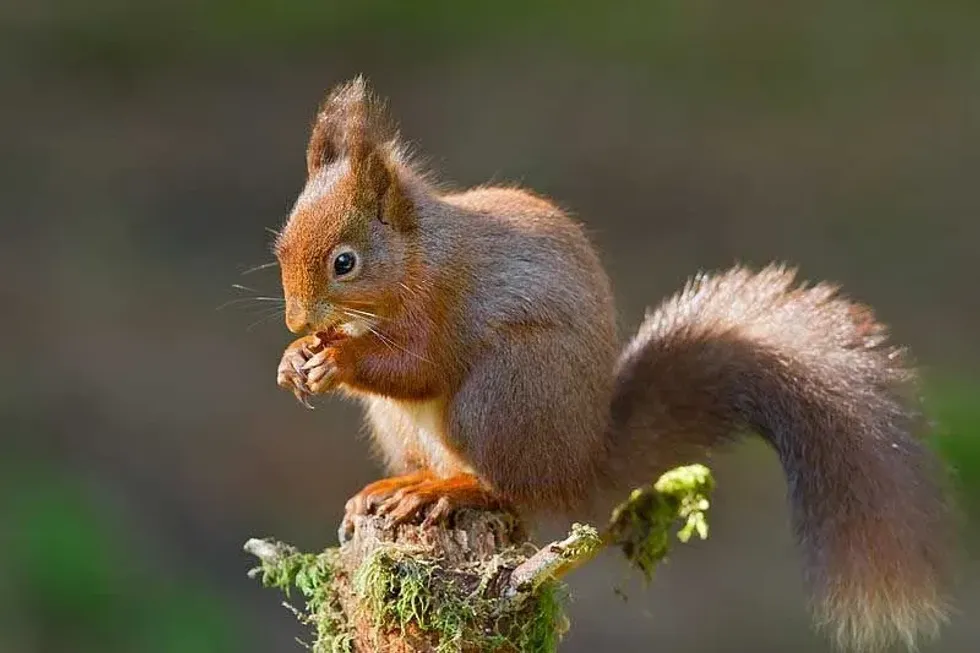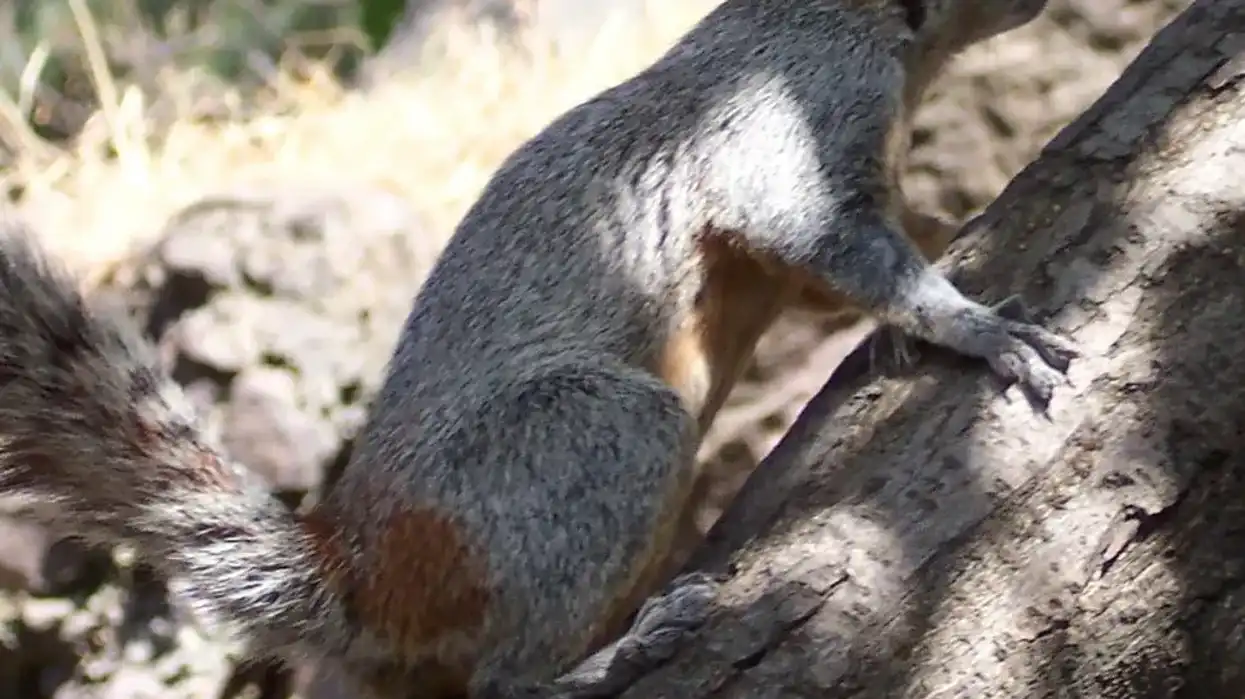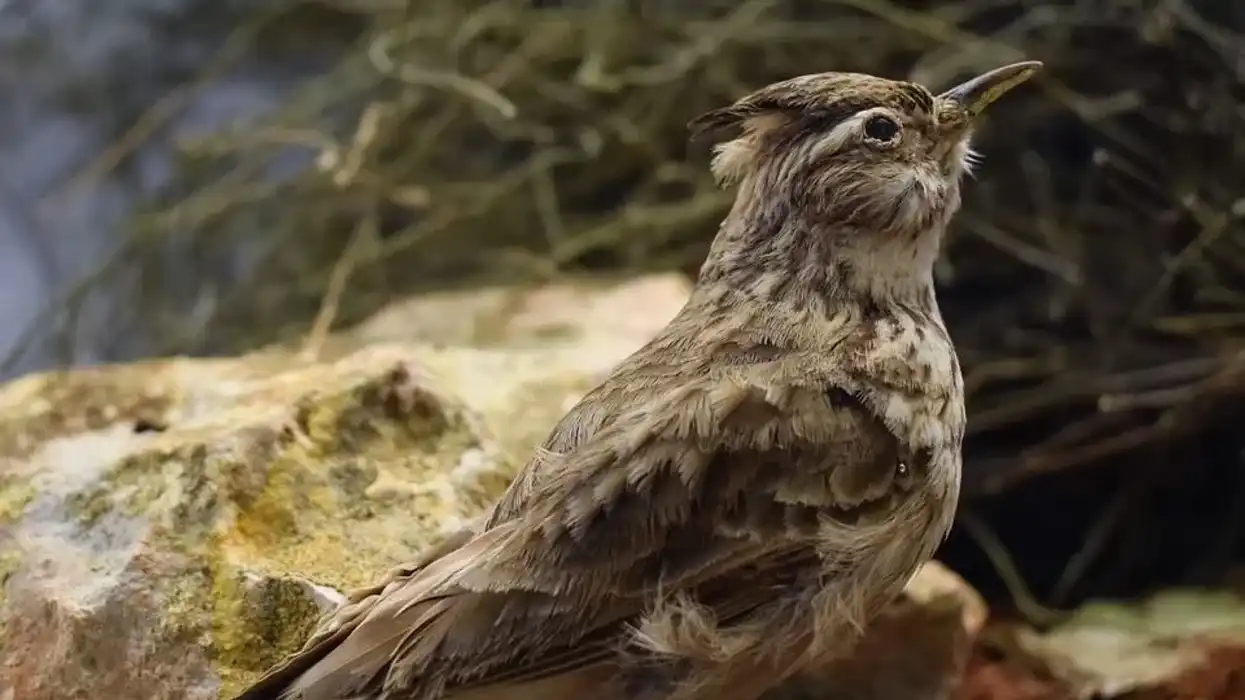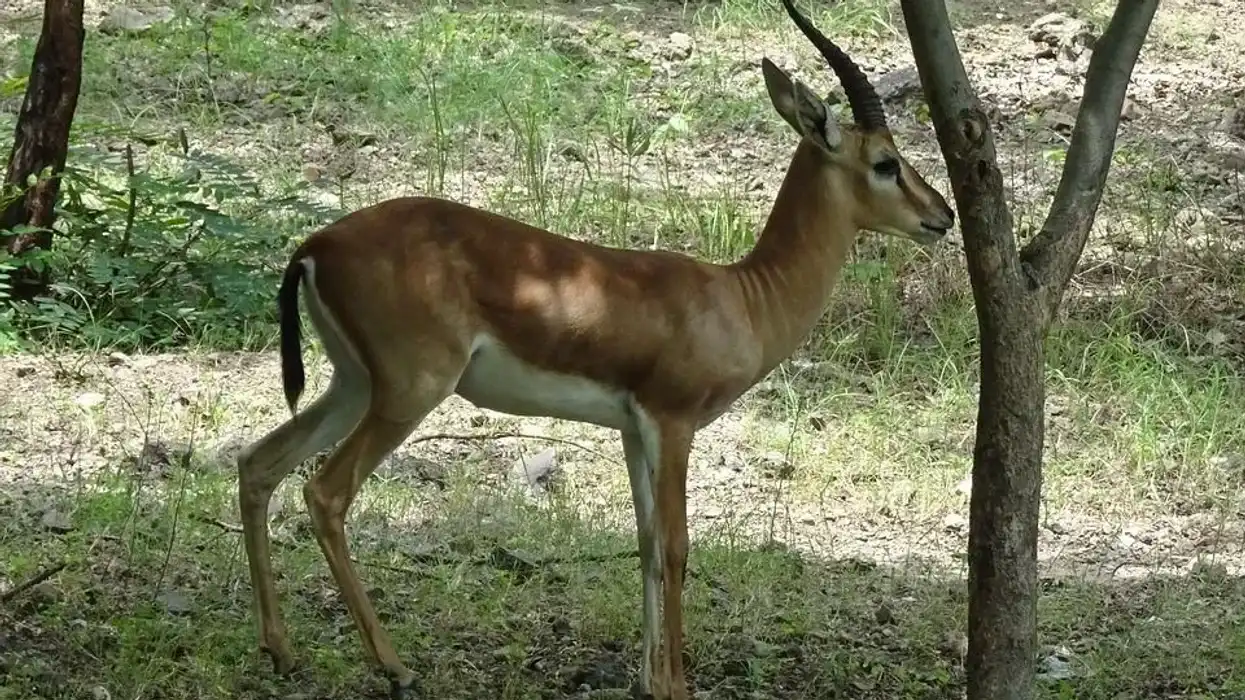The Eurasian red squirrel (Sciurus vulgaris) is an animal native to Eurasia. These squirrels can be found in a variety of coat colors. Their natural habitat includes forests, where they nest in Boreal pine trees and Siberian pine trees, among others. They can also be found near any suburban habitat.
Reproduction occurs twice a year for the Eurasian red squirrels, and the young spend a significant time in their nest. These squirrels reach sexual maturity at around one year after birth.
They are herbivorous in nature and mainly rely on seeds, nuts, and acorns as food. Like other squirrels, this species also hides their food in trees and burrows.
The population of Eurasian red squirrels is threatened by the eastern grey squirrel species, which has been introduced in some of their ranges. Eurasian red squirrels contribute to reforestation, as some of the seeds hidden by them are usually forgotten and grow into new trees.
To learn more about the Eurasian red squirrel, keep reading! If you like this article, you can also check out these antelope squirrel facts and grey squirrel facts.
Eurasian Red Squirrel Interesting Facts
What type of animal is a Eurasian red squirrel?
The Eurasian red squirrel (Sciurus vulgaris) is a squirrel species native to Europe and North Asia. The range of these animals covers a wide number of European and Asian countries.
What class of animal does a Eurasian red squirrel belong to?
Eurasian red squirrels belong to the class Mammalia. They are a part of the Sciuridae family, which includes squirrels of other genera and species, as well.
How many Eurasian red squirrels are there in the world?
Currently, the exact number of individuals belonging to this species is not known. Nevertheless, the population of Eurasian red squirrels has been decreasing, according to the International Union for Conservation of Nature or IUCN, in some parts of its range like Italy, Ireland, and the United Kingdom.
In Mongolia, the Eurasian red squirrel numbers face significant fluctuations.
Fortunately, their population is not severely fragmented. In the year 2013, less than 140,000 Eurasian red squirrels were reported in the United Kingdom, with a major chunk of that population being in Scotland.
Where does a Eurasian red squirrel live?
Eurasian red squirrel populations are native to Europe and North Asia. They are endemic to Eurasia. Their natural range includes a wide number of countries.
Some of the European countries where Eurasian red squirrel populations can be found are United Kingdom, Italy, France, Ireland, Greece, and Denmark. In Asia, their populations are located in Japan, China, Mongolia, South Korea, and so on. These animals have also been introduced in various countries, some of which are Armenia, Kazakhstan, and Georgia.
What is a Eurasian red squirrel's habitat?
The habitat of Eurasian red squirrels mainly consists of forests. This species nests in coniferous and deciduous forests. They like living in large trees that can act as a steady source of food.
Some of the common tree species favored by the Eurasian red squirrels in their North European range are the Siberian pine tree, Norway spruce tree, and Boreal pine tree. These animals build their nests in large holes of trees. Squirrels of this species can also be seen near suburban areas like gardens and parks.
Who do Eurasian red squirrels live with?
Eurasia red squirrels are solitary in nature and spend most of their time alone. Only during the breeding season do males and females come into contact with each other.
Young Eurasian red squirrels are taken care of by their mother, so they can be seen living together, as well. These squirrels are also sold as pets in some places, and hence, they can live with humans too.
How long does a Eurasian red squirrel live?
The lifespan of Eurasian red squirrels is between 6-7 years in the wild. However, 75-80% of the young squirrels die in the first winter, following their birth. In captivity, they can attain the age of 10-12.
How do they reproduce?
The breeding season in Eurasian red squirrels (Sciurus vulgaris) occurs twice a year, in late winter from February to March and in the summer from May to August. During this time, male squirrels gather in the female's home range and compete with the other males in order to get a chance to successfully mate.
Once the female has chosen her mate and mating has been carried out, the female gives birth to 3-7 offspring, following a gestation period of 38-39 days.
Young squirrels are fully dependent on their mother after birth, till about 30 days.
At 8-10 weeks old, young red squirrels become independent but continue living with their mother for some time. At about the age of one, they gain sexual maturity.
What is their conservation status?
The conservation status of these squirrels has been marked as Least Concern by the International Union for Conservation of Nature or IUCN. Though the Eurasian red squirrels can be abundantly found in their natural range, their populations have faced a severe decline in certain areas.
In Great Britain, the introduction of eastern grey squirrels from North America has caused significant harm to the Eurasian red squirrel populations.
Apart from facing competition for the same resources, eastern grey squirrels also carry the squirrel pox virus, which can cause death in the Eurasian red squirrels. Other threats faced by red squirrels are habitat loss and over-exploitation by humans for their fur and skin.
Eurasian Red Squirrel Fun Facts
What do Eurasian red squirrels look like?
Eurasian red squirrels (Sciurus vulgaris) possess a variety of coat colors like red, brown, gray, or black, depending on the season and location. In Great Britain, only individuals with a red coat are seen, while in Central Europe, the population can have a mixture of different colored coats.
Their underparts are white or creamy in color. These squirrels can also be identified through their ear tufts.
They are known to shed their coat twice a year. During the winter, their fur appears thicker with longer ear tufts, when compared to the summer season. The tail in red squirrels is quite long and helps in maintaining their balance.
The fur on the tail changes once a year. The change of fur in this animal is also controlled by their diet and health.
How cute are they?
The squirrels of this species are really cute in appearance with their beautifully colored body and ear tufts. The young squirrels are also quite adorable.
How do they communicate?
These squirrels communicate through vocalizations, visual means, and chemical cues. Some of the red squirrel calls are 'wrruhh-ing' and 'chucking' noises. During their young age, red squirrel kittens produce shrill sounding calls. The female squirrels produce a certain odor during the mating season, to signify they are in their fertile reproductive phase.
How big is a Eurasian red squirrel?
The total body length of Eurasian red squirrels is between 7.5-9 in (19-22.8 cm), with the tail measuring between 6-8 in (15.2-20.3 cm). Eurasian red squirrels are nearly two times smaller than the eastern grey squirrel species that have a body length between 15-20.6 in (38-52.3 cm) and an average weight of 19 oz (538.6 g).
It is slightly smaller than the flying squirrel, whose length stands at around 10 in - 12 in (25.4 cm - 30.4 cm).
How fast can a Eurasian red squirrel run?
Eurasian red squirrels can run with a speed of 14 mph (22.5 kph). These squirrels are also capable of jumping 6.6 ft (2 m) off the ground.
How much does a Eurasian red squirrel weigh?
The weight of this animal is between 7-17 oz (198.4-482 g).
What are the male and female names of the species?
Males and females of this species are known as buck and doe, respectively.
What would you call a baby Eurasian red squirrel?
A baby Eurasian red squirrel is known as a kitten, kit, or pup.
What do they eat?
Eurasian red squirrels have a herbivorous diet. Some of their common food materials are nuts, acorns, seeds, and beechnuts. They can also resort to eating fungi, vegetables, flowers, and eggs of birds, or nestlings, in case there is a lack of their regular food.
They use their lower incisors to break open nuts. Red squirrels learn about their food sources from a young age from their mother. They are known to store their food in the ground or in the bark of trees.
Are they dangerous?
Like most squirrels, red squirrels are not really dangerous to humans. However, they can cause trouble if they build a nest in your house, as they are noisy. They can also damage food crops.
Would they make a good pet?
Eurasian red squirrels are sold as pets in some regions. However, the pet trade negatively affects the population of this animal. Hence, they are best kept in their natural habitat.
Did you know...
Some of the common predators of Eurasian red squirrels are wildcats, stoats, and birds like owls and goshawks.
Why are red squirrels so aggressive?
Eurasian red squirrels do not display excessive aggressive behavior towards other red squirrels or humans. They aren't territorial in nature, either. However, there have been instances of aggressive behavior among red squirrels with the animals holding their body up in a boxer position and making chittering sounds.
How can you tell if a red squirrel is male or female?
The male and female red squirrels have a similar appearance. The two can be differentiated based on the distance between their anal and genital openings, which are placed close together in female red squirrels than in the males.
Here at Kidadl, we have carefully created lots of interesting family-friendly animal facts for everyone to discover! For more relatable content, check out these pitbull mastiff mix facts and dunnart facts pages.
You can even occupy yourself at home by coloring in one of our free printable red squirrel coloring pages.









